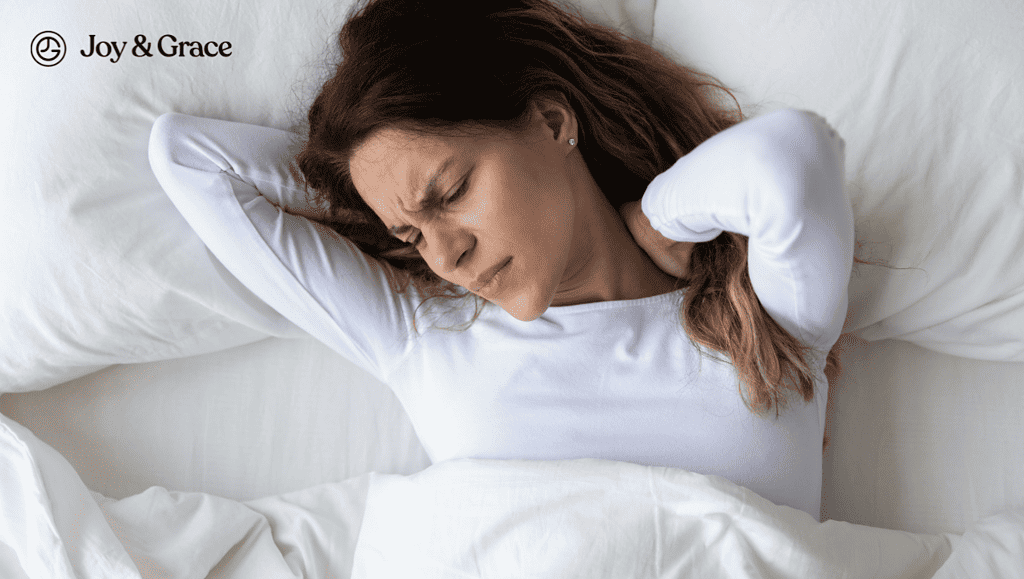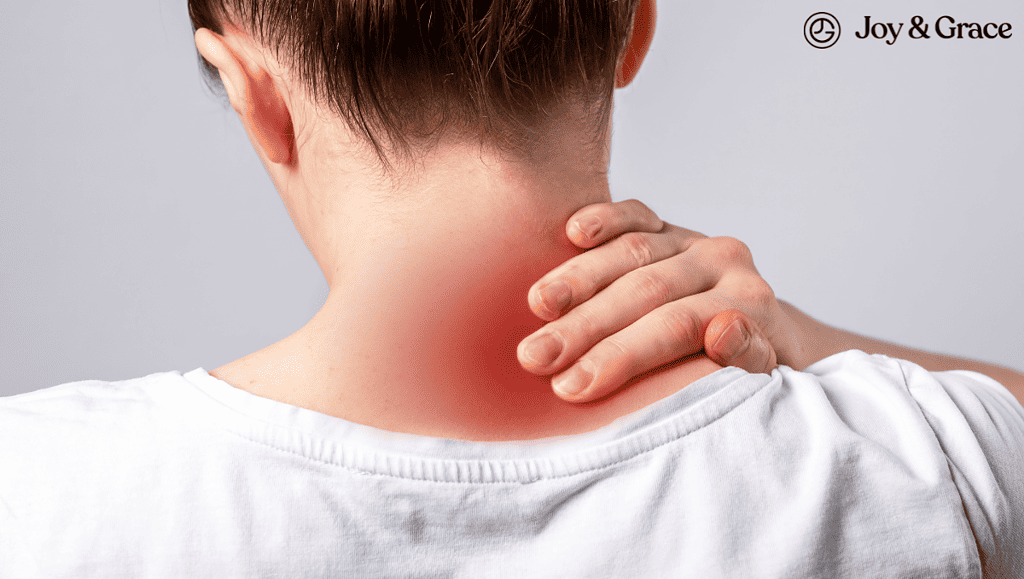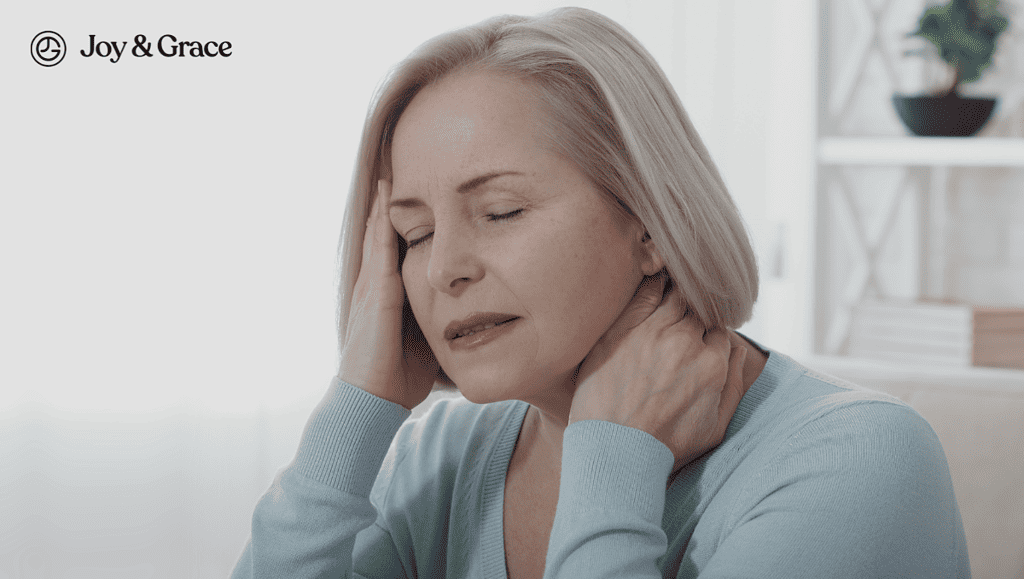In our bustling lives, mornings hold the promise of new beginnings. But when greeted by persistent headaches and nagging neck pain, they can quickly become a struggle. Headaches and neck pain can cast a shadow over our entire day. They can impair our ability to focus, hinder our productivity, and steal our joy.
But fear not. At Joy & Grace, we firmly believe that everyone deserves to wake up feeling refreshed, recharged, and ready to embrace the day ahead. We're here to guide you through the maze of morning discomfort and help you reclaim your mornings!
Why Do I Wake Up With A Headache And Neck Pain Every Morning?
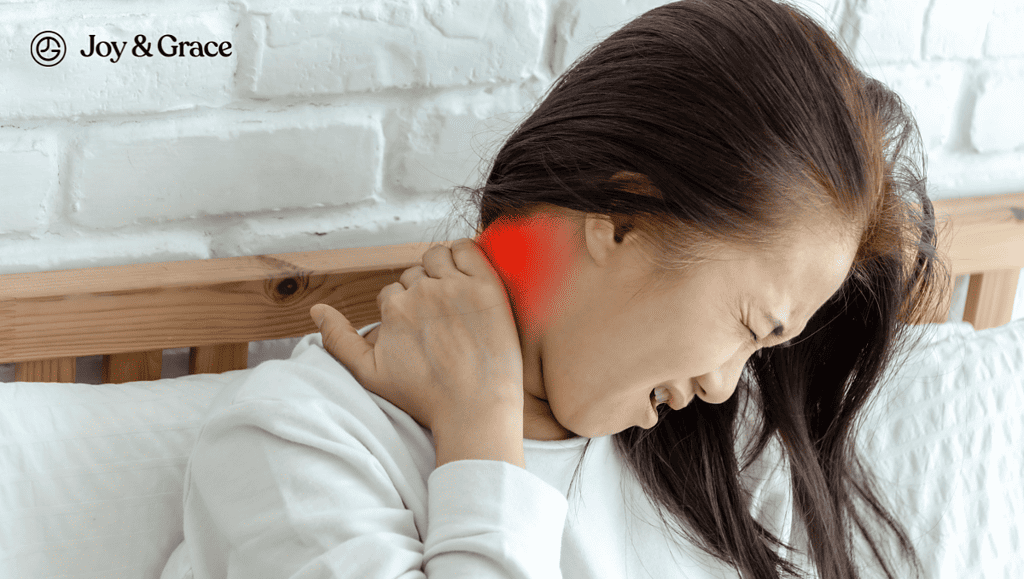
If you find yourself waking up every morning with a headache and neck pain, you are not alone. Many experience this discomfort, but it doesn't have to be a permanent part of your morning routine.
You may be experiencing headaches and neck pain in the morning for several reasons. This can include:
- Overall Sleep Quality
Poor sleep quality is linked to both headaches and neck pain.
Various factors can cause poor sleep quality and sleep deprivation. Stress, an uncomfortable sleeping environment, unhealthy sleep habits, certain medications, and underlying health conditions can all contribute to a restless night.
But don’t lose sleep just yet! Two easy-to-fix common culprits are improper sleeping positions and bad pillows and mattresses:
- Sleeping Position
One possible cause is your sleeping position. Sleeping in a position that strains your neck can lead to discomfort and pain. This can occur if you sleep with your head tilted to one side, on your stomach, or without proper neck support
Sleeping with your neck improperly aligned with the rest of your spine can also trigger tension headaches (tension-type headaches). - Your pillows and mattress
Another possibility is that your pillow or mattress is causing your discomfort. Over time, pillows and mattresses can lose support and fail to contour your body correctly. This can lead to a bad sleep position, cause neck and head pain, and lead to poor sleep quality.
- Sleeping Position
Stress and tension can also contribute to headaches and neck pain in the morning. If you are experiencing high levels of stress or tension, it can manifest in physical symptoms such as headaches and neck pain.
- Dehydration
Another possible cause of morning headaches and neck pain is dehydration. When you sleep, your body naturally loses water through sweating and breathing. And if you don't replenish lost fluids, you could wake up with a headache and an achy neck. Drinking enough water before you sleep can prevent dehydration and headaches in the morning.
These are some of the common and easy-to-fix reasons why you might wake up with headaches and neck pain. However, sometimes, there may be true medical conditions behind the pain. Let’s see what those are.
What Conditions Can Cause Morning Headaches And Neck Pain?
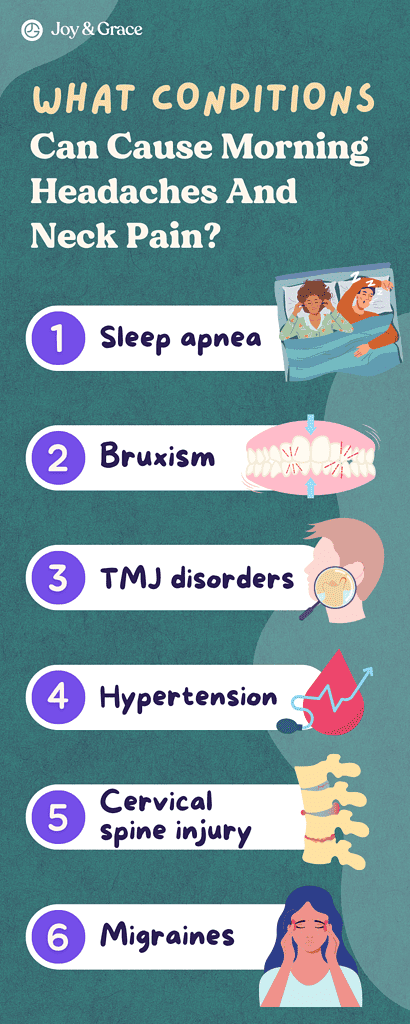
As we said, most of the possible reasons we mentioned earlier were relatively benign. However, some serious conditions can also cause you to wake up with headaches and neck pain. These are:
Sleep apnea (both central and obstructive sleep apnea) could be to blame if you consistently wake up with morning headaches and neck pain. Sleep apnea is a sleep disorder that makes you temporarily stop breathing when you sleep. This leads to decreased oxygen levels, resulting in headaches and discomfort.
According to a study, 29% of people with sleep apnea suffer from morning headaches.
Neck issues are also associated with sleep apnea. So it’s likely that you are already prone to neck pain.
Sleep apnea has also been shown to cause neuropathic pain and decrease your pain tolerance, possibly contributing to your morning neck pain.
Bruxism is the medical term for teeth grinding or clenching, often occurring when you sleep. This condition has been associated with musculoskeletal disorders, including neck pain and headaches.
Grinding or clenching your teeth can put excessive pressure on the jaw and the surrounding muscles. Some studies also associate sleep bruxism with TMJ disorders.
However, other studies have conflicting evidence and suggest that bruxism does not lead to TMJ disorders.
TMJ disorders refer to problems affecting the temporomandibular joint, which connects your jaw to your skull. These disorders can cause pain and dysfunction in the jaw joint and surrounding muscles. TMJ disorders can also cause headaches and neck pain and may be the cause of your morning misery.
Morning hypertension, which refers to high blood pressure, specifically in the morning hours, can potentially contribute to headaches and neck pain upon waking up.
When blood pressure is consistently elevated, it can strain the blood vessels of your brain and neck. This increased pressure can result in headaches, which may be particularly noticeable upon waking up. Similarly, the tension and constriction in the blood vessels can contribute to neck pain and stiffness.
Furthermore, uncontrolled high blood pressure can lead to other head and neck pain-inducing conditions, such as sleep apnea.
- Cervical spine injury
Any damage to your cervical spine can also cause you to wake up with neck pain and headaches. Headaches from cervical spine damage are called cervicogenic headaches.
Migraine headaches are another possible culprit for your morning discomfort. In one study, 40.2% of migraine sufferers have a migraine attack early in the morning. And surprise, surprise, migraines can also cause neck pain.
How Do I Stop Waking Up With A Headache And Neck Pain?
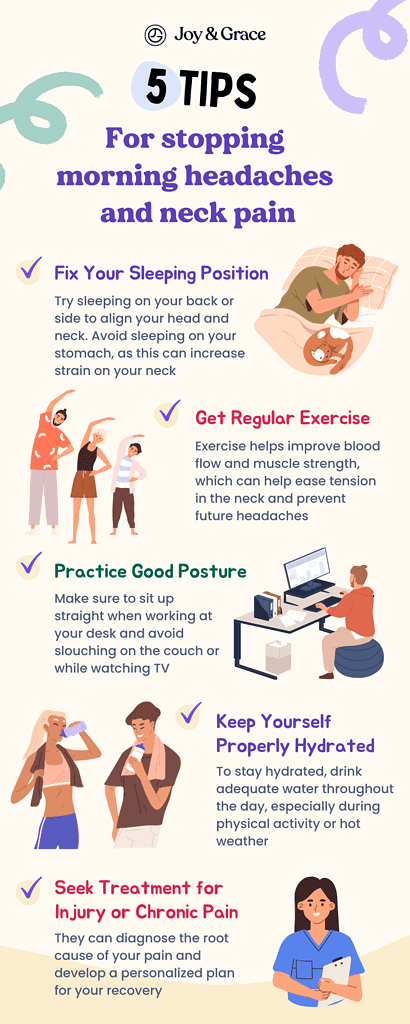
We bet you’re exhausted from having to wake up to pain-filled mornings. But don't throw in the towel just yet! There are a few things you can do to finally kiss those morning headaches and neck pain goodbye:
- Fix Your Sleeping Position
One of the most common causes of headaches and neck pain is sleeping in a way that strains your neck muscles. Try sleeping on your back or side to align your head and neck. Avoid sleeping on your stomach, as this can increase strain on your neck.
- Get Regular Exercise
It may seem unrelated, but regular exercise can help alleviate neck pain and reduce headaches. Exercise helps improve blood flow and muscle strength, which can help ease tension in the neck and prevent future headaches.
- Practice Good Posture
Poor posture throughout the day can lead to chronic neck pain and headaches. Make sure to sit up straight when working at your desk and avoid slouching on the couch or while watching TV. Stretching and regular breaks from sitting can also help alleviate built-up tension in your neck and shoulders.
- Keep Yourself Properly Hydrated
As mentioned earlier, dehydration is a common reason for morning headaches and neck pain. Adequate hydration helps with pain and ensures that your body functions optimally. To stay hydrated, drink adequate water throughout the day, especially during physical activity or hot weather. And make sure to pay attention to your body's signals for thirst.
- Seek Treatment for Injury or Chronic Pain
If your headaches and neck pain are related to an injury or underlying condition, seek medical treatment. They can diagnose the root cause of your pain and develop a personalized plan for your recovery.
How Should I Sleep To Avoid Neck Pain And Headaches?
The first step to sleeping without neck pain is selecting the right type of pillow. A pillow that is too soft will not offer enough support, while one that is too firm may cause your neck to be pushed up, leading to discomfort. Ideally, you should use a pillow that ensures your neck aligns with your spine.
You can also stretch before bed to loosen your muscles and avoid using too many pillows. Sleeping with too many pillows can cause your head to be elevated, leading to neck strain. And lastly, consider investing in a good-quality mattress that properly supports your spine.
Another important consideration is your sleeping position. Your sleeping position can influence how your neck aligns with the rest of your spine. Improper neck alignment can damage the cervical spine and lead to chronic neck pain and headaches.
What Is The Best Sleeping Position To Avoid Waking Up With Headaches And Neck Pain?
Sleeping in the correct position can make a big difference in avoiding morning headaches and neck pain.
The best sleeping position depends on your preferences and any underlying medical conditions. However, here are a few general recommendations:
- Back sleeping
Sleeping on your back with a supportive pillow is often considered the best position for spinal alignment. Choose a pillow that supports the natural curve of your neck and keeps your head in a neutral position. Placing a small pillow or rolled-up towel under your knees can help maintain the natural curve of your lower back.
- Side sleeping
If you prefer to sleep on your side, ensure that your pillow is of adequate height to keep your head aligned with your spine. A pillow with good support and contouring properties can help maintain proper spinal alignment. Additionally, placing a pillow between your knees can help reduce muscle strain on your hips and lower back.
- Avoid stomach sleeping
Sleeping on your stomach can strain your neck and lead to spine misalignment. If you find it difficult to break this habit, try using a thin or no pillow at all to minimize strain on your neck.
When Should I Worry About Waking Up With Headaches And Neck Pain?

If you are experiencing occasional headaches and a sore neck after a poor night's sleep or a long day at work, it's likely nothing to worry about. However, if these symptoms become chronic or are accompanied by other symptoms, you may need to see a healthcare professional. Here are some situations in which you should consider seeking medical advice:
- Frequency, duration, and intensity
You can consider talking to your healthcare provider if you frequently wake up with severe headaches and neck pain.
Also, consider seeking medical attention if the symptoms persist for an extended period of time, such as several weeks or longer.
- Associated symptoms
Pay attention to any additional symptoms accompanying the headaches and neck pain. This can include:
- Fever
- Sensitivity to light
- Confusion
- Dizziness
- Nausea
- Visual disturbances
- Weakness
- Sleep disturbances
If your sleep is consistently disturbed due to headaches and neck pain, it may indicate an underlying problem that needs to be addressed.
- Trauma or injury
Suppose you recently experienced any trauma or injury to your head or neck, and the headaches and neck pain started after that. In that case, you should seek medical attention promptly to rule out serious injuries or complications.
- Chronic Conditions
Monitoring any changes or worsening of symptoms is important if you have pre-existing conditions. Talk with your healthcare provider if you notice any significant changes in your condition. - Stroke symptoms
A stroke is a severe condition that may also cause you to wake up with headaches and neck pain. 40-50% of strokes happen early in the morning and are called morning or wake-up strokes.
While wake-up strokes are relatively rare, they are a medical emergency that requires immediate attention.
If you experience sudden and severe headaches accompanied by:
- Neck pain upon awakening
- Weakness
- Numbness
- Difficulty speaking
- Loss of consciousness
- Changes in vision
It's crucial that you seek immediate medical assistance. Strokes can have serious consequences, so prompt evaluation and treatment are essential for the best possible outcome. If you suspect a stroke, call emergency services or go to the nearest emergency room immediately.
Takeaway
Waking up with a pounding headache and a stiff neck can be frustrating and exhausting. This condition can interfere with daily activities, hinder productivity, and lead to a decrease in the quality of life.
Your morning discomfort may likely be from your sleeping position or stress. If so, you can quickly find relief by making some simple lifestyle changes.
But if you suffer from chronic morning headaches and neck pain, it's essential to identify the underlying cause to find the best treatment plan.
